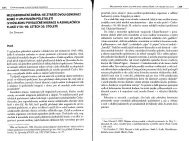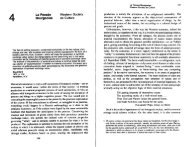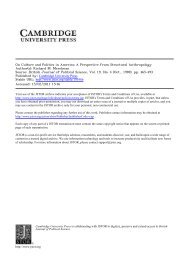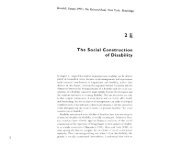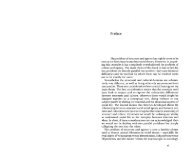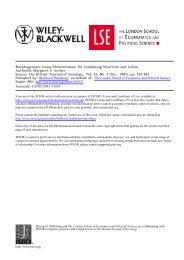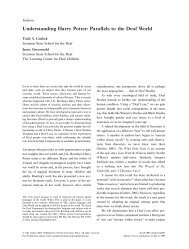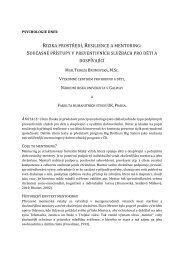Culture and Practical Reason Two Paradigms of ... - Moodle
Culture and Practical Reason Two Paradigms of ... - Moodle
Culture and Practical Reason Two Paradigms of ... - Moodle
- No tags were found...
You also want an ePaper? Increase the reach of your titles
YUMPU automatically turns print PDFs into web optimized ePapers that Google loves.
Chapter <strong>Two</strong> 100 <strong>Culture</strong> <strong>and</strong> <strong>Practical</strong> <strong>Reason</strong><strong>Two</strong> <strong>Paradigms</strong> <strong>of</strong> Anthropological Theory101reorder nature by its own purposes-because, for Steward, all purpose butthe practical disappears at the moment <strong>of</strong> production. Ecological wisdomconsists in forgetting the cultural ordering <strong>of</strong> nature at every decisive point.The interaction <strong>of</strong> technology with the environment according to determinaterelations <strong>of</strong> production-on which is erected a cultural morphologyistaken by Steward for an instrumental fact. Hence the order that istransmitted through action into structure is the eco-Iogic <strong>of</strong> effectiveadaptation.Steward's problematic is a design for the neglect in theoretical principle<strong>of</strong> ecology as a cultural system. Partly this is a matter <strong>of</strong> omission, failureto develop in concept what is recognized in fact. Steward is well aware thatthe particular character <strong>of</strong> technology stipulates the character <strong>of</strong> theenvironment-that is, gives significance to resources by a criterion <strong>of</strong>cultural relevance. But in Steward's mode <strong>of</strong> argument this is a given,along with the relations <strong>of</strong> family <strong>and</strong> <strong>of</strong> production (division <strong>of</strong> labor bysex: men hunting, women gathering). The cultural ordering <strong>of</strong> nature isthus disguised as the premise to a naturalistic ordering <strong>of</strong> culture. Indeed,the entire intentionality <strong>of</strong> the productive process is neglected in the assumptionthat this is a "subsistence" economy, condemned by the poverty<strong>of</strong> technical means to whatever meager existence can be squeezed out.Such naturalization <strong>of</strong> the hunter-gatherer economy is, <strong>of</strong> course, thereceived anthropological wisdom. 34 And it plays directly into an "ecological"explanation <strong>of</strong> the total culture. For in ignoring the historical character<strong>of</strong> the economic objectives, both in quality <strong>and</strong> in quantity, both theparticular goods that are sought <strong>and</strong> the intensity <strong>of</strong> the process, it missesout on the cultural organization <strong>of</strong> the relation to culture. 35 Not evenhunters are engaged in a mere subsistence economy. Every such groupdistinguishes the edible from the inedible, <strong>and</strong> not only for the population34...A man who spends his whole life following animals just to kill them to eat, or movingfrom one berry patch to another, is really living just like an animal himself' (Braidwood1957, p. 122; cf. Sahlins 1972, chap. I; Lee <strong>and</strong> DeVore 1968).35. Specifically missing is the cultural intentionality embodied in the code <strong>of</strong> desirableobjects. As Baudrillard explains, properly speaking an "object <strong>of</strong> consumption [hence<strong>of</strong> production] does not exist any more than a phoneme has an absolute meaning inlinguistics. This object does not take meaning either in a specific relation with thesubject ... or in an operative relation to the world (the object-utensil); it only takes onmeaning through its difference from other objects, according to a hierarchial code"(1972, p. 61). Such being the case, there are "no needs save those <strong>of</strong> which the systemhas need," <strong>and</strong> it is not that consumption is a function <strong>of</strong> production, but that "comsummativite"is a structural mode <strong>of</strong> production (ibid., p. 89).as a whole but for specific classes <strong>of</strong> age, sex, <strong>and</strong> ritual condition as theseare locally defined. Moreover, a host <strong>of</strong> examples from Australianaborigines are enough to show that different types <strong>of</strong> intergroup exchangehave corresponding implications for the intensity <strong>and</strong> social patterns <strong>of</strong>work. The Australians are even capable <strong>of</strong> a concrete totemism, in whichneighboring groups specialize in producing different utilitarian objects fortrade from materials that are equally available to all, in this way duplicatingon the economic plane the increase rites <strong>and</strong> the interdependence <strong>of</strong>groups imagined in the totemic system. In brief, what Steward neglects isthe organization <strong>of</strong> work as a symbolic process operating both in therelations <strong>of</strong> production <strong>and</strong> in the finalities. The activity <strong>of</strong> production isinstead culturally deconstituted, to make way for the constitution <strong>of</strong>cultureby the activity <strong>of</strong> production.The real issue posed for anthropology by all such practical reason is theexistence <strong>of</strong> culture. The utility theories have gone through many changes<strong>of</strong> costume, but always play out the same denouement: the elimination <strong>of</strong>culture as the distinctive object <strong>of</strong> the discipline. One sees through thevariety <strong>of</strong> these theories two main types, proceeding along two differentroutes to this common end. One type is naturalistic or ecological-as itwere, objective-while the second is utilitarian in the classic sense, oreconomistic, invoking the familiar means-ends calculus <strong>of</strong> the rationalhuman subject.Naturalism underst<strong>and</strong>s culture as the human mode <strong>of</strong> adaptation. <strong>Culture</strong>in this view is an instrumental order, conceived (according to theparticular ecological school) as engaged in reproducing itself as culture orin maintaining the human population within limits <strong>of</strong> biological viability.In either event, the praxology is "objective" in the sense that explanationconsists <strong>of</strong> determining the material or biological virtues <strong>of</strong> given culturaltraits; there is no theoretical dem<strong>and</strong> that the actors calculate directly inadaptive utilities-on the contrary, the most triumphant "eurekas!" willbe reserved for demonstrations that they do so malgre eux. The disappearingact performed on culture consists <strong>of</strong> its absorption, one way or another,within nature. Either cultural practice is a behavioral mode <strong>of</strong> appearance<strong>of</strong> the laws <strong>of</strong> natural selection, just like any •• species-specific behavior,"or else it is subsumed within a more general ecosystem which alone <strong>and</strong> asa totality enjoys the powers <strong>of</strong> self-regulation or "mind" <strong>and</strong> whose constraintsare realized in cultural forms.Rather than a pragmatics <strong>of</strong> cultural forms, the subjective utilitarianism



